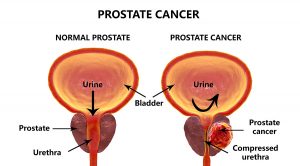New research showed that blocking saturated fatty acids may help patients with prostate cancer. Notably, patients who are obese and patients who are slim have different outcomes regarding prostate cancer. Frequently obese patients eat poor diets with lots of saturated fatty acids. This leads to a poor outcome when they get prostate cancer. In contrast, slim people who do not overeat saturated fatty acids have a better clinical outcome. This research was published in Science Translational Medicine in February 2019.
Research supporting that blocking saturated fatty acids may help patients with prostate cancer
Renea Taylor was one of the contributors from the Cancer Program at the Monash Biomedicine Discovery Institute in Clayton, Australia. Another contributor was Prof. Matthew Watt, the head of the Physiology Department at the University of Melbourne, Australia. Many clinicians have observed in the past that prostate cancer initially grows slowly, but over the years it tends to grow more aggressively. With this in mind these researchers asked themselves what leads to the transition from slow cancer growth to aggressive cancer growth in prostate cancer. They noticed that it was men who consumed more saturated fatty acids who developed more aggressive prostate cancers.
Blocking fatty acid metabolism reduces prostate cancer growth
- The researchers took operative samples from men with prostate cancer and grafted them onto mice. They found that whenever saturated fatty acids were administered, this fuelled aggressive growth of the human grafts.
- The fatty acid transporter CD36 is responsible for saturated fatty acid metabolism. It is because of CD36 that the slow growing prostate cancer turned into the aggressive form of prostate cancer.
- Next, the researchers could identify the gene responsible for the CD36 fatty acid transporter. Eliminating the gene changed the lipid metabolism and slowed down prostate tumor growth.
- Another approach to slowing down prostate tumor growth was to create antibodies directed against CD36.
The authors wrote: “These findings identify a critical role for CD36-mediated fatty acid uptake in prostate cancer and suggest that targeting fatty acid uptake might be an effective strategy for treating prostate cancer”. Prof. Watt commented further: “We’ve known for many years that dysfunctional fatty acid metabolism is linked to many chronic diseases”.
Some prostate cancer statistics
The American Cancer Society stated that in 2019 there would be 175,000 men diagnosed with new prostate cancer. More than 30,000 men will die in the US from prostate cancer in that year. After lung cancer prostate cancer is the second leading cause of cancer death in men in the US.
Discussion
This research describes a new approach to finding another cure for prostate cancer. Instead of attacking the cancer with radiotherapy or chemotherapy it works on changing the metabolism of prostate cancer. Disabling the gene for the CD36 fatty acid transporter the researchers were able to slow down prostate cancer growth. They managed to achieve the same with antibodies directed against CD36. These experiments showed that changing the lipid metabolism slowed down prostate tumor growth.
Conclusion
Research from Australia has come up with a new prostate cancer cure. It works by changing the saturated fatty acid metabolism. Clinicians knew that obese men and men who eat a lot of saturated fat have a higher risk of developing aggressive prostate cancer. The researchers took operative samples from men with prostate cancer and grafted them onto mice. They observed that when the mice received food high in saturated acids the grafted human prostate cancer turned more aggressive. Destroying the CD36 fatty acid transporter with antibodies or gene therapy made the prostate cancer grow much slower.
We do not have a new prostate cancer cure in humans yet. But with clinical trials regarding an antibody against the CD36 fatty acid transporter will likely be tested. In the meantime, it is prudent not to wait for research results.
What men should do, when their doctor finds they have prostate cancer
Men can take action by changing their diet. Cut out saturated fatty acids from food and increase omega-3 fatty acid intake.







